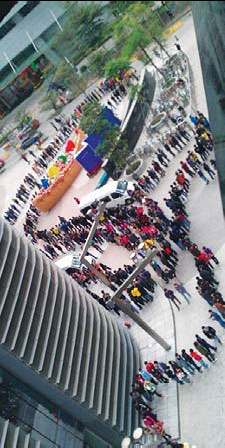
 'Taken 2' grabs movie box office crown
'Taken 2' grabs movie box office crown
 Rihanna's 'Diamonds' tops UK pop chart
Rihanna's 'Diamonds' tops UK pop chart
 Fans get look at vintage Rolling Stones
Fans get look at vintage Rolling Stones
 Celebrities attend Power of Women event
Celebrities attend Power of Women event
 Ang Lee breaks 'every rule' to make unlikely new Life of Pi film
Ang Lee breaks 'every rule' to make unlikely new Life of Pi film
 Rihanna almost thrown out of nightclub
Rihanna almost thrown out of nightclub
 'Dark Knight' wins weekend box office
'Dark Knight' wins weekend box office
 'Total Recall' stars gather in Beverly Hills
'Total Recall' stars gather in Beverly Hills
Lucky for some, but financially painful for others
Updated: 2012-02-09 10:05
By Xu Jingxi (China Daily)
|
||||||||
 |
|
Tencent employees line up outside the company's headquarters in Shenzhen, Guangdong province, to get envelopes of money from management. Provided to China Daily |
The Spring Festival holiday is over and the post-holiday blues have taken hold. Many of us drag our feet to the office where busy work schedules await. But those working in Guangdong province were excited by the first working day, tempted by the lucky money in hongbao (red envelopes) handed out by their bosses.
A photo of Tencent employees lining up outside the company's headquarters in Shenzhen, Guangdong, has recently gone viral. They stood in the cold wind from 10 am, waiting for their turns to take the lift to the office of Ma Huateng, the company's CEO, on the 37th floor.
On Jan 31, the first working day after the holiday, Tencent's top managers met employees and handed out red envelopes in person.
This is a tradition among Guangdong and Hong Kong companies. The lucky money, called "lai si" in Cantonese, is put into a red envelope. Lai si means good luck and conveys the wish that everything will go smoothly in the new lunar year.
Yang Ning, human resources director at the Guangzhou office of Starcom Mediavest Group China, describes the custom as the "antidote" to employee post-vacation syndrome.
"It brings a festive air and lights up the office," Yang says. "While year-end bonuses reward employees for a year's hard work, lucky money on the first working day boosts morale and serves as an inducement for another productive year."
Yang says lucky money was budgeted at 200 yuan ($31.76) per person this year. But additionally, department heads dip into their own pockets to give extra lucky money to their immediate staff members.
If you are unmarried, congratulations! You are allowed to ask for another red envelope from your married co-workers, from the first to the 15th days of the first month of the lunar calendar.
Therefore, on the first working day after Spring Festival, an office in Guangdong or Hong Kong bustles with groups of unmarried people going up to married people and "robbing" them of lucky money.
Yan Li, 25, the human resources director of a real estate company in Guangzhou, joined the army of "robbers" at her office. Yan and her colleagues joined up with their peers in the administrative department after seeing them line up outside the administrative head's office.
Then the army went from department to department to ask for red envelopes from married colleagues, even though they are unacquainted with some of their married colleagues.
Yan got 20 or so red envelopes and pocketed about 150 yuan. The amount of lucky money in each red envelope is limited to 1 yuan, 5 yuan or 10 yuan.
Yan admits she guesses who will give out the biggest red envelopes and targets them. Some of her colleagues post details of how much lucky money they got on their micro blogs, which pressures those who have to give out red envelopes to be generous.
Some married couples are overwhelmed by the crowds of "robbers" at their offices and are concerned that the lucky money tradition is turning sour.
A Guangzhou resident, surnamed Zhang, complains that her husband, a doctor, is rushed by a large group of nurses every time he appears in a ward.
"Some of them are not even acquainted with my husband. Some of them are already married," the 50-year-old claims.
Zhang says she wasn't "thick-skinned" enough to ask for lucky money when she was young and unmarried.
"It seems that many people nowadays are asking for red envelopes to cash in rather than to receive blessings," Zhang says.
Guangzhou resident Yang Ning, however, welcomes the lucky money "robbers" at her office.
"They dare to ask for lucky money from me because they think I am an approachable boss," she says. "Handing out red envelopes personally gives me a good opportunity to get closer to my colleagues."
Yang prepared various amounts of lucky money and ran a lottery this year, adding to the fun of the first working day of the Lunar New Year for her employees.
Most Viewed
Editor's Picks

|

|

|

|

|

|
Today's Top News
Health new priority for quake zone
Xi meets US top military officer
Japan's boats driven out of Diaoyu
China mulls online shopping legislation
Bird flu death toll rises to 22
Putin appoints new ambassador to China
Japanese ships blocked from Diaoyu Islands
Inspired by Guan, more Chinese pick up golf
US Weekly

|

|







